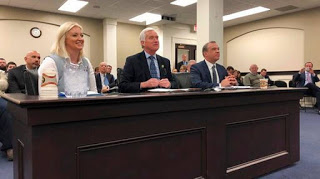Bill to raise legal age to buy tobacco products to 21 fails on 4-6 committee vote; bill’s effectiveness questioned, called ‘PR move’

Sen. Steve Meredith, middle, with Altria Vice President
David Fernandez, right, and Juul Labs lobbyist Jennifer
Cunningham on his bill to raise the legal age for buying
tobacco products. (Photo: Adam Beam, The Associated Press)
—
A bill to raise the legal age to buy tobacco products from 18 to 21 in Kentucky was voted down by the Senate Agriculture Committee Feb. 25, prompting a standing ovation from many in the room, Adam Beam reportsfor The Associated Press.
Friends and foes of tobacco both found things to dislike about the bill.
“Where I come from, tobacco is still king,” said Republican Sen. Stan Humphries, a Trigg County tobacco farmer who then voted against the bill.
After the meeting, Ben Chandler, CEO of the Foundation for a Healthy Kentucky, called the bill a public-relations maneuver and said “The tobacco industry’s PR move failed.” He said such a bill should “include more severe penalties on retailers who sell these products to underage youth without taking reasonable precautions to verify age. By supporting a bill without these measures, the tobacco industry knows it will be ineffective” against “an epidemic of youth e-cigarette use in Kentucky and the nation that, in less than a year, has erased years of progress in protecting kids from nicotine and secondhand tobacco emissions.”
Historically, the industry has opposed efforts to restrict tobacco use from people who older than 18, the age Americans can register to vote and join the military, but at least one company is supporting such bills as it “bets its future on e-cigarettes and other vapor products,” Beam reports. “In December, Altria — one of the world’s largest tobacco companies — purchased a $13 billion stake in Juul,” by far the leading maker of an electronic cigarette that is the favorite of teenagers.
Altria Vice President David Fernandez told the committee, “Putting tobacco on par with alcohol makes sense and we do hope that doing that will also persuade policymakers to approach tobacco regulation a bit more reasonably.” The week before, Virginia, where Altria subsidiary Philip Morris is based, had become the seventh state to raise the tobacco-buying age to 21.
Senate Bill 249‘s sponsor, Sen. Stephen Meredith, R-Leitchfield, pointed out the health reasons for it, including an oft-cited fact that tobacco-related illnesses cost Kentucky $2 billion each year, including $600 million in Medicaid expenses.
Committee Chairman Paul Hornback, R-Shelbyville, made an economic argument, warning that the Food and Drug Administration “could put Kentucky ‘out of the tobacco business’ with its potential rulings impacting the sale of e-cigarettes and other vapor products because of concerns about their impacts on youth smoking rates.” But the bill failed on a vote of 4 to 6.
“Hornback indicated lawmakers could try to vote on the bill again before adjourning next month,” Beam writes. “But it appears the bill, or any other tobacco-prevention bill, would have a tough time passing the state legislature.” He notes that a bill to make all school properties and events tobacco-free has stalled in the House.